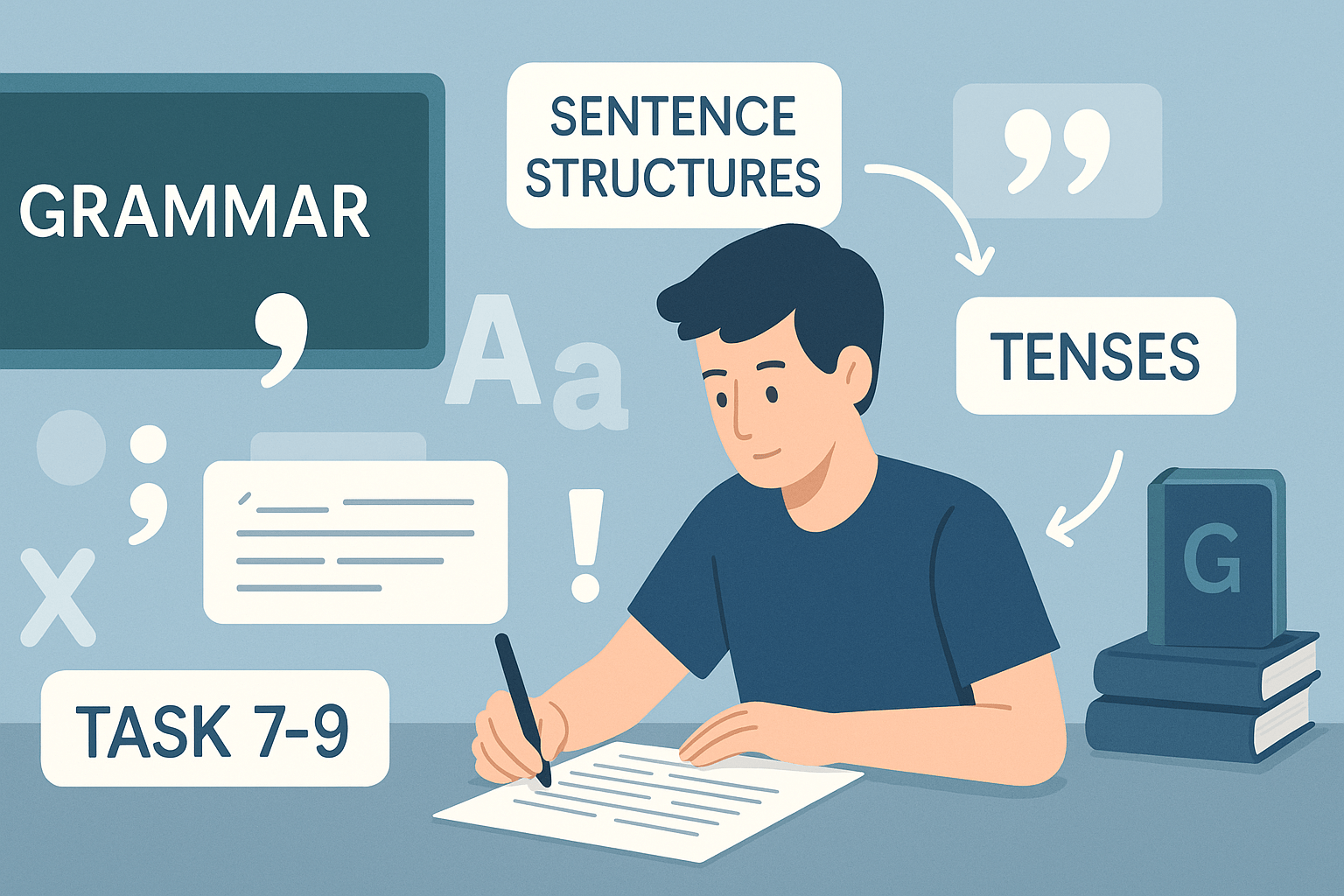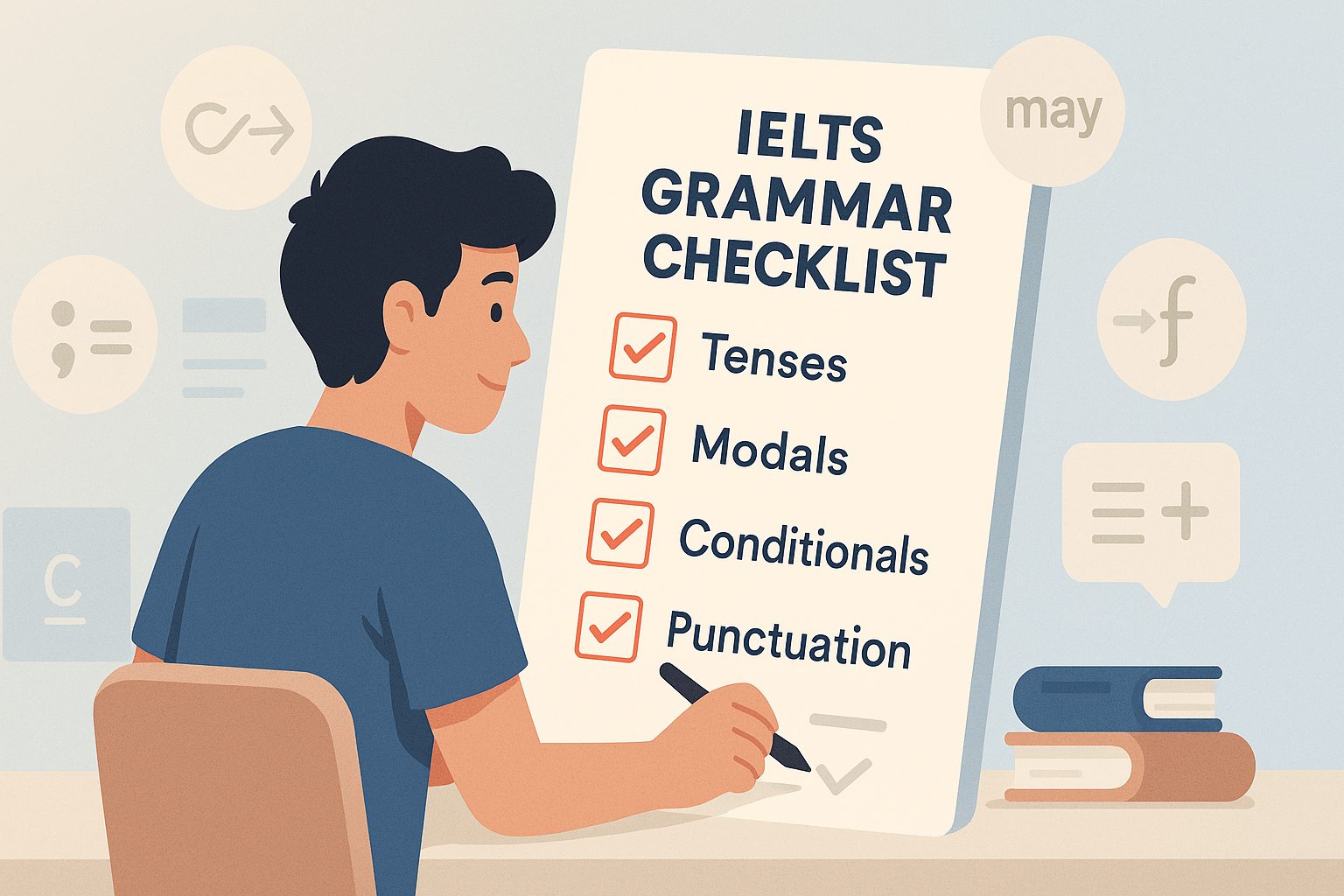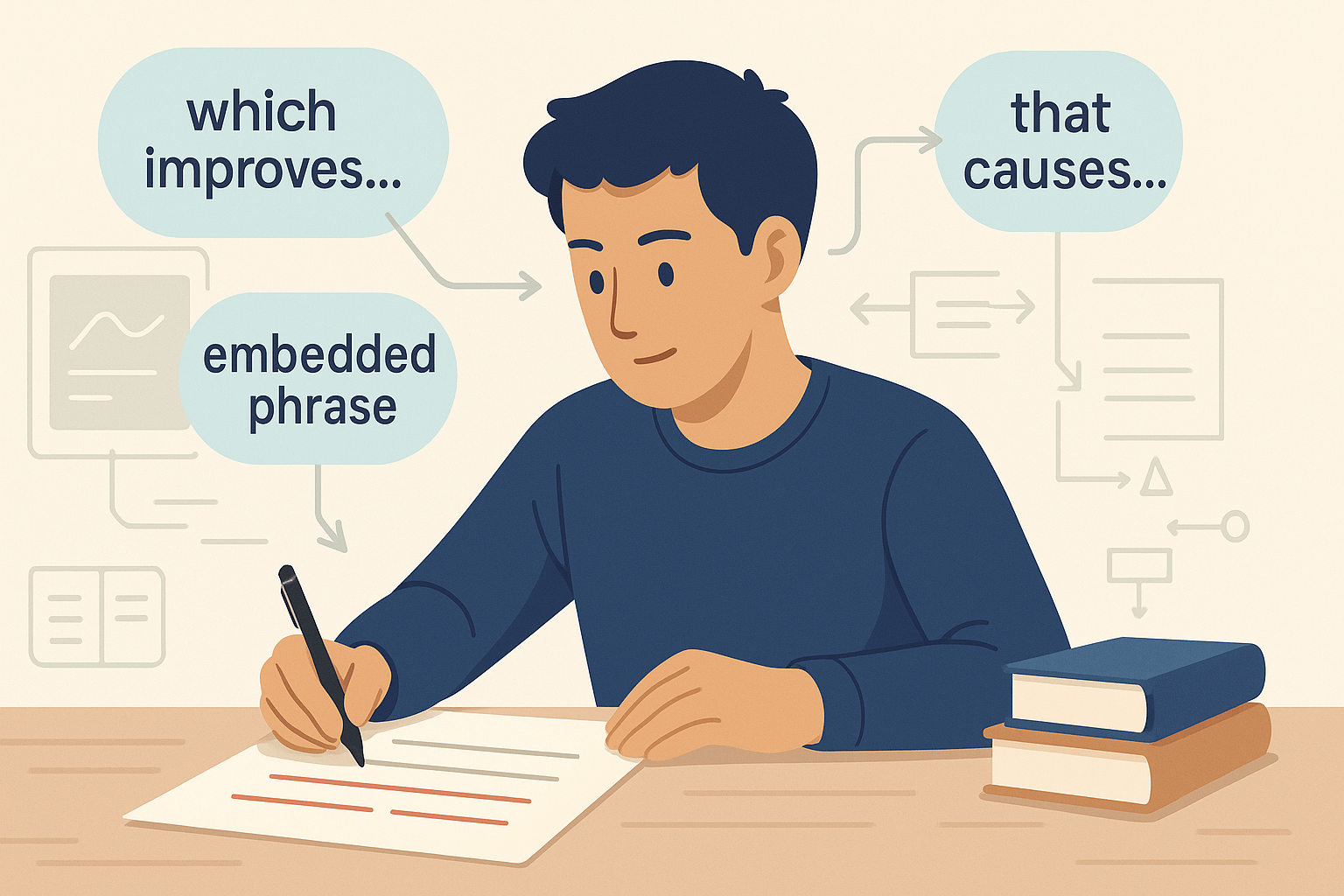When I teach IELTS students around the world, one question comes up again and again:
“How can I improve my writing score from Band 6 to Band 7 or even 9?”
The answer is grammar and accuracy.
IELTS writing grammar plays a major role in your Writing Task 2 score, because Grammatical Range and Accuracy is 25% of your band score.
In this blog, I’ll teach you:
- ✅ Essential grammar rules for Task 2
- ✅ High-scoring sentence structures for Band 7–9
- ✅ Common mistakes to avoid
- ✅ Teacher tips to use grammar naturally and accurately
Before you start, check my IELTS Writing Task 2 Vocabulary for Band 7–9 for words and phrases that complement these grammar techniques.
Why IELTS Writing Grammar Matters
IELTS examiners score your writing on four criteria:
- Task Response – Did you answer the question fully?
- Coherence and Cohesion – Are your ideas logically connected?
- Lexical Resource – Is your vocabulary wide and accurate?
- Grammatical Range and Accuracy – Can you use correct grammar and varied sentence types?
Even if your ideas are brilliant, poor grammar can lower your score.
For official guidance, check:
Essential Grammar Rules for IELTS Writing Task 2
Here are the core grammar areas you must master to reach Band 7–9.
1. Tense Consistency
Your essay should have consistent tenses based on context:
- Present simple: General facts or opinions
- Present perfect: Describing trends or changes over time
- Past simple: Historical examples
- Future forms: Predictions and solutions
Example:
“Global warming is caused by excessive greenhouse gas emissions and will continue to threaten ecosystems if left unaddressed.”
Teacher Tip:
Mixing tenses unnecessarily is a common Band 6 mistake. Always check tense logic.
2. Sentence Variety (Simple, Compound, Complex)
High scores require sentence variety:
- Simple sentence: “Pollution is a global concern.”
- Compound sentence: “Pollution is a global concern, and governments must take action.”
- Complex sentence: “Although pollution is a global concern, many nations still rely heavily on fossil fuels.”
Using complex sentences naturally shows Band 7+ grammar range.
🔗 For example essays using natural linking, see:
3. Subject-Verb Agreement
Even strong students lose marks for simple agreement errors.
- ✅ “The government has introduced new policies.”
- ❌ “The government have introduced new policies.”
Teacher Tip:
- Treat government, team, society as singular in formal writing.
- Always double-check verbs in complex sentences.
4. Active and Passive Voice
Using both active and passive forms increases grammatical range.
- Active: “The government implemented new traffic laws.”
- Passive: “New traffic laws were implemented by the government.”
When to use passive voice:
- To sound formal and objective
- To focus on action, not the actor
Example:
“Plastic bags were banned to reduce environmental pollution.”
5. Conditional and Hypothetical Sentences
Conditionals show advanced grammar and logical reasoning:
- Type 1 (real): “If countries reduce emissions, pollution will decrease.”
- Type 2 (hypothetical): “If countries invested in renewable energy, pollution would decrease.”
- Type 3 (past hypothetical): “If governments had acted earlier, climate change could have been mitigated.”
Using conditionals in problem/solution essays can impress examiners.
6. Modals for Formality and Hedging
Modals help you hedge statements, making your essay academic and polite:
- should / must / need to (strong advice)
- could / might / may (possibility)
Example:
“Governments should invest in renewable energy, which could reduce dependence on fossil fuels.”
7. Punctuation and Clarity
Even small punctuation mistakes can affect coherence:
- Use commas to separate clauses:
“Although pollution is rising, some cities have implemented stricter laws.” - Avoid run-on sentences: Combine ideas with linking words or semicolons.
Common Grammar Mistakes to Avoid
Here are typical errors that keep students at Band 6:
- Long sentences without punctuation
- Mixing tenses in one paragraph
- Using informal contractions like “don’t” or “can’t”
- Incorrect plural/singular forms (“informations” → “information”)
- Forgetting articles (“Government should act” → “The government should act”)
✅ Learn to combine grammar + vocabulary by reviewing:
IELTS Writing Task 2 Band 9 Collocations
Sample Band 9 Paragraph Using Accurate Grammar
“Although climate change is becoming a major concern, many countries continue to rely on fossil fuels. If governments invested in renewable energy, emissions would decrease, and future generations could benefit from a cleaner environment.”
This example shows:
- Complex sentences with subordination
- Correct tense use
- Conditional structure for solutions
Quick Practice Exercise
Rewrite this sentence using better IELTS writing grammar:
“People use cars a lot, and the air is bad.”
Suggested Answer:
“Frequent car usage leads to severe air pollution, which poses health risks for urban residents.”
FAQ Section
Q1: What grammar is required for IELTS Writing Task 2?
You need accurate tenses, subject-verb agreement, sentence variety, and correct punctuation to reach Band 7–9.
Q2: How does grammar affect my IELTS writing score?
Grammar affects Grammatical Range and Accuracy (25%). Mistakes lower your band, while varied and correct grammar boosts your score.
Q3: Should I use complex grammar in every sentence?
No. Use a mix of simple, compound, and complex sentences naturally. Forced complexity can reduce clarity.
Conclusion
Mastering IELTS writing grammar is the key to moving from Band 6 to 7, 8, or 9.
When you:
- ✅ Use tenses and sentence structures accurately
- ✅ Include conditionals, passive voice, and modals naturally
- ✅ Avoid common grammar mistakes
… your essays will sound clear, formal, and examiner-approved.
🔗 Next step: Combine this grammar guide with our IELTS Writing Task 2 Vocabulary for Band 7–9 to achieve your target band.






7 Responses